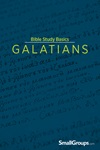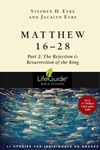Scot McKnight is a college professor, an Anglican minister, a prolific writer, and blogger. He’s a first-rate New Testament scholar but approaches the Bible with a pastor’s heart. He’s just as apt to present a paper to a room of PhDs as he is to unpack a biblical text to the “plumber in the pew.” Scot is the author of numerous New Testament commentaries and theological books including The Jesus Creed, The King Jesus Gospel, and A Church Called Tov.
Scot, thanks for taking the time to answer some questions today. You have a real passion for the Bible. It’s not just a professional tool; I have heard you talk about your love for the Word. Where does that come from and has that always been part of your makeup?
I can only say from God. I had a rededication experience at 17 years old and the day that happened–a summer day at a Christian camp–I wanted to read and study the Bible. I began a commitment to read the Bible through the first year after that and finished nine months, and then I began– with the aid of my youth pastor–to teach myself Greek. I went to college to study the Bible and everything else was in my way! I have been studying the Bible now for 50 years.
Some groups use the Bible mechanically. It’s a tool to get to a point someone is trying to make. How can a small group leader keep a group from falling into that trap?
This is a hard one as some people see what they see no matter if it is there. I often compare Bible reading to taking the Rorschach Test. It’s a test of mirrored images administered by psychologists who ask a client to tell them what they see. Of course, what they see is not there because the images are of nothing. Bible reading can be that way and it’s a good exercise then for Bible study groups to admit that we are finding what we are looking for. Instead, I recommend imaginative reading: Read the Beatitudes and imagine you are a poor farmer: what do you hear? Imagine you are a wealthy Herodian or political leader: what do you hear? Imagine you are the wife of a fisherman: what do you hear? Imagine you are someone who is in Jerusalem and are a member of the group that lives at Qumran: what do you hear? Imagine you are a Pharisee: What do you hear? (This kind of discipline can help people get out of their seeing-what-they-want-to-see.)
What can a small group do to encourage group members to develop a deeper habit of Bible reading?
I recommend reading the Bible in a non-devotional way just to read it and to learn it. Ask people to read two chapters a day from the Old Testament—no notes, no commentaries, just reading. If we do this for a year or two we will grow in learning the story of the Bible. We are often unfamiliar with huge portions of our Bible and we need to concentrate on those passages.
Develop a notebook of observations of what you see as you read the Bible. Record some questions you have. Record names and events and build some memory of those special people and events.
- Read a commentary–say the Tyndale commentaries (not too long). Learn from those authors.
- Read with a Bible atlas.
- Read with a Bible dictionary or encyclopedia.
I also recommend reading the Bible from different perspectives. Find commentaries or Bible studies outside your comfort zone and learn what others see in the Bible vs. what you see. Do the same with study Bibles of different translations and different publishers. It is too easy to become echo chambers.
One of the trends over the last several years is an increase in the use of video in small groups and many of those videos are more inspirational than they are instructional. Let’s assume a group is committed to using video curriculum–some churches insist on it. What can the leader do to incorporate more Bible in their group?
With a little practice, the leader can find one or two significant passages in the Bible from which the video is drawn or from which the video may have been drawn. Study the passage and ask people to read it after watching the video to see if it can stimulate some questions and comments about the video.
You value the whole Bible, but you have devoted your scholarship to the New Testament. Let’s say a small group decides to spend a year or two only in the NT, what would you recommend they study?
- One Gospel (Matthew, Luke, or John)
- Acts of the Apostles
- Galatians with James
- Romans
- 1 Peter
- 1 John
The Epistles are a favorite to study in small groups, especially Paul’s letters. How can a leader keep a study of Ephesians, for instance, from just focusing on propositional truth? Is there a way to bring out the underlying story and context?
- Work from the back forward.
- What specific moral problems are found?
- What are the specific moral exhortations?
- How do the problems and exhortations fit into the “doctrinal” sections of chapters 1-4?
- In other words, integrate the theology with the ethics to see that the theology was written to meet the moral challenges facing the church in Ephesus.
- What are the major events in God’s history with Israel and the early church that are brought out?
- Which authors of the OT are quoted or echoed in the letter?
- How do these answers help to form the story of the Bible at work in Ephesians?
In recent years, various film depictions of Christ and New Testament times have been released. Some have attempted to fully recreate scenes found in the Gospels and Acts and some have taken poetic liberty. Some small groups have used these films, but even those who don’t often have members who have viewed these films on their own. What are the advantages and disadvantages of such films? How can a leader make use of them without supplanting the text the films are based on?
The scholarship today about Jesus, about the Gospels, about history, and about social realities make it much easier to “imagine” realities that faced Jesus. So, what I see in these movies makes sense even if they are not absolutely accurate. They are close approximations that give legs and feet to the world of Jesus in a way that helps us see what Jesus was like in his world.
There was a recent movie about the apostle Paul I thought was amazingly accurate in history and recreation of social conditions. So, we are now prepared to create movies that have the opportunity to be much more accurate and realistic than ever before.
Of course, compare them to the text of the Bible to show what is said and what is imagined or created. Knowing the difference is a great opportunity for sharpening our skills in Bible knowledge.
What academic or study resources do you recommend to people to people who want to dive deeper into the New Testament? Let’s assume they didn’t attend a Bible college or seminary.
The IVP Bible Commentary: New Testament
The Archaeological Study Bible
Logos Bible Software
In Stone and Story
The New Testament in Its World: An Introduction to the History, Literature, and Theology of the First Christians
Tyndale New Testament Commentaries
The Story of God Bible Commentaries
The Moody Bible Atlas
Lexham Geographic Commentary on the Gospels
A Week in the Life Series
The Jesus Creed
Pastor Paul
What role should reading the Bible together in a group play in the small group discussion? Given that many are intimidated reading in front of others, what advice can you offer to make the most of this opportunity?
It is wise for a leader to inform participants which passage will be under discussion and ask each to read the passage in advance. Ask persons if they are willing, or unwilling, to read the passage aloud to the group. Some may want only to read aloud and not be asked questions. Others may not want to read aloud. Those who want to read can practice at home, so they are more prepared.
Thanks, Scot, for sharing with us!
Follow Scot’s blog at Jesus Creed.









